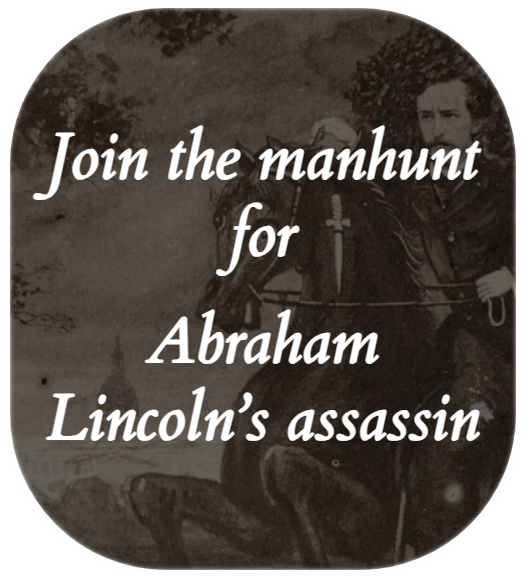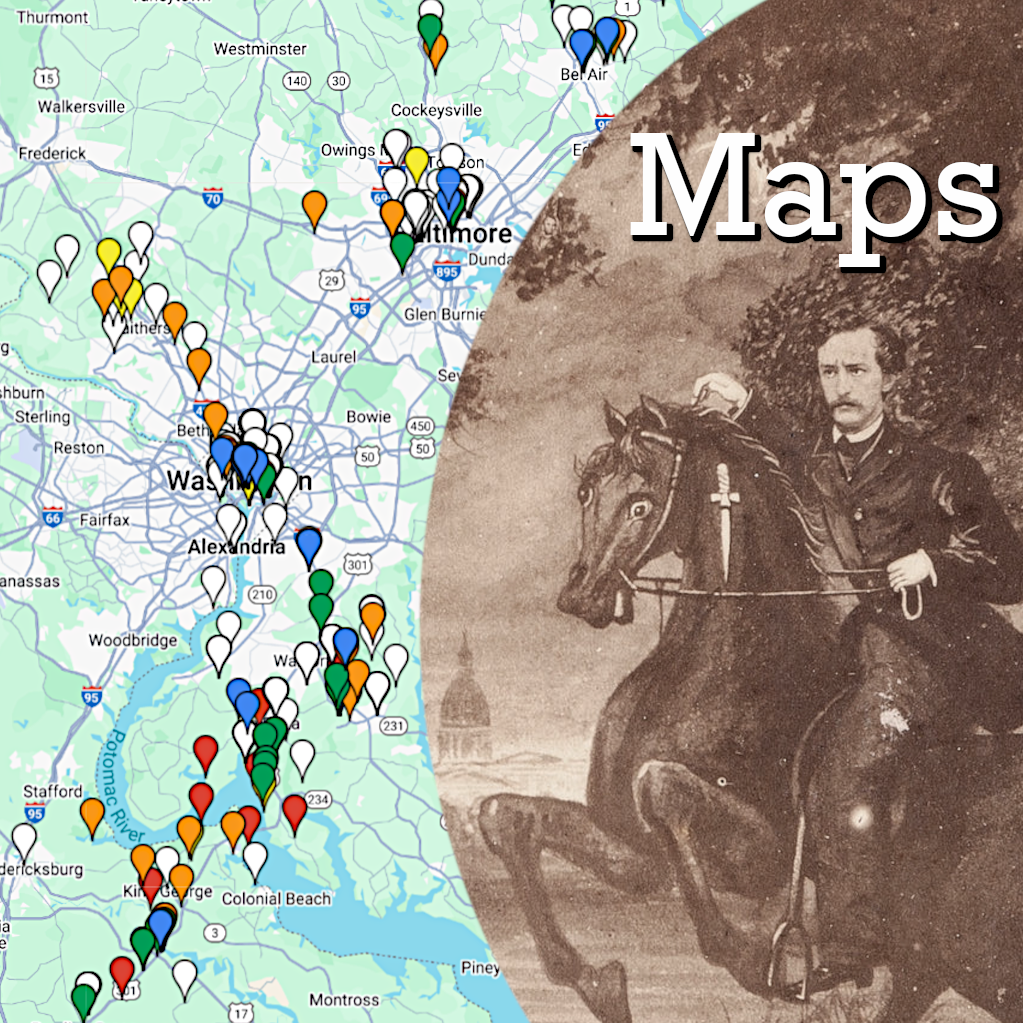On June 15, 1863, John Wilkes Booth began an acting engagement in St. Louis, Missouri. While Booth visited many different cities as a touring star, the audiences of St. Louis were very supportive of his efforts. This particular engagement was his fourth time playing in the city in only a year and a half. In addition to the audiences, Booth was also aided by the fact that he had a pretty decent connection in the St. Louis theater scene. During each of Booth’s engagements in the city, he performed at Ben DeBar’s St. Louis Theatre.
Ben DeBar was essentially family to Booth. In 1840, Booth’s eldest brother, Junius Brutus Booth, Jr. married Ben DeBar’s sister, Clementina. June and Clementina’s union did not last however because, in 1851, June took a page out of his father’s book and ran off with another woman. Despite this unpleasantness, Ben DeBar maintained a good relationship with John Wilkes Booth and the rest of the Booth family. Ben DeBar hired John Wilkes Booth for five different engagements in St. Louis, and when he opened another theater in New Orleans, Louisiana, John Wilkes was hired there as well.
The June 1863 engagement in St. Louis was like any other for the 25 year-old actor. The newspapers noted that Booth was, “nightly greeted by full and fashionable houses; his performance[s] eliciting the most enthusiastic applause.” Booth’s engagement was scheduled to last from the 15th to the 27th, a normal two week engagement.
After a few days in St. Louis, Booth was presented with an offer from an unusual source. A Missouri resident by the name of R. J. Morgan approached Booth asking him if he could take Booth’s place on the final night of his engagement. It was not unheard of for actors to make such requests of their peers though it was more common for actors to request the services of their peers for benefit performances or during emergencies. Being asked to surrender a performance was less common. This request was even more strange, however, because the solicitor was not even a fellow actor, at least not yet.
We know very little about the life of R. J. Morgan. His foray into theater begins and ends over the course of about a year. Four months prior to his proposition to John Wilkes Booth, R. J. Morgan was a relatively unknown man. He was born in England and at the beginning of the Civil War he resided in Missouri. In early 1863, he was briefly living in Davenport, Iowa. What his business was and why he was in Iowa is a mystery. Apparently, he was able to make somewhat of a name for himself as one who knew a little bit about European and American poetry. On February 17th, a group of citizens in Davenport wrote a letter to Morgan which was published in the newspaper. The men appealed to Morgan to honor them with a public reading of various poems known to him. One would expect that Morgan must have previously given private readings of poetry which motivated his friends and neighbors to ask for a public showing. Morgan accepted the invitation of the men stating, “I shall avail myself of the flattering invitation extended to me…” and “the entertainment proposed to be given, I trust you will look upon as an amateur affair, with little professional pretensions.” Morgan secured the use of Davenport’s Metropolitan Hall free of charge after insisting that the proceeds of the readings would not go to him, but would instead be donated to the needy families of absent Union soldiers. It might be a bit cynical but, given his later actions with Booth, it is not out of the realm of possibility that R. J. Morgan desired to start a career as an dramatic orator and organized the invitation and philanthropic gesture to work in his advantage.
On the night of February 24, 1863, R. J. Morgan presented his “Evening with the Poets”. He presented readings of 12 poems including Beautiful Snow, a piece also rendered by John Wilkes Booth from time to time. While the audience enjoyed Morgan’s readings, the turnout was a bit lackluster for his first time out. “The audience was not large,” the newspaper said, “but those who had the pleasure of listening to the reading of the selections on that occasion may count themselves fortunate…It is certain that the public greatly underestimated Mr. Morgan’s ability, else the Hall would have been filled…” Morgan stayed true to his word, however, and donated the night’s entire proceeds of $18 to the Adjutant General of Iowa. “Your request, that I will apply the amount to the relief of needy families of our absent soldiers shall be faithfully complied with,” the General wrote to Morgan (who subsequently had the note published in the newspaper).
This initial, charitable reading, kick-started Morgan’s new career as a dramatic reader. Four days after his debut, Morgan gave another evening of readings in Rock Island, Illinois, just across the Mississippi River from Davenport. For his second reading he duplicated his first program entirely, but this time he took home the proceeds. After that, Morgan spent the next two months travelling around the Midwest giving readings in different cities. We have records of him performing in Iowa City, Muscatine, and Davenport, Iowa; Springfield and Jacksonville, Illinois; and in St. Louis, Missouri. He was apparently still in St. Louis when John Wilkes Booth came to town.
As Morgan’s readings went on, he began expanding his repertoire. He incorporated more and more Shakespeare, doing readings from Hamlet, Othello, and Henry IV. Coincidentally, while he was on the road, Morgan’s talents as a reader drew comparisons with a family of actors, a member of which would be shortly known to him. After a performance in Muscatine, Iowa the newspapers wrote, “The rendering and acting of Hamlet in his deathless soliloquies, was of that high and brilliant order that few attain who reach for it. The true life, energy and expression was breathed into it so faithfully that even a Booth or a Forrest might listen profitably.” After four months, Morgan apparently believed he was ready to move beyond being merely a reader and elocutionist. He wanted to be an actor and so he approached John Wilkes Booth in order to make that happen.
While Morgan’s correspondence to Booth doesn’t appear to survive, the two brief notes Booth wrote back to Morgan are housed in the Abraham Lincoln Presidential Library in Springfield as part of the Taper Collection. It’s clear that Morgan appealed to Booth to surrender the final day of his engagement so that Morgan could take his place and make his own theatrical debut. On June 22nd, Booth wrote to Morgan setting his terms for such a deal.
“Dear Sir,
I will agree to give up Saturday night 27th on condition you pay me fifty dollars $50 to be paid on or before Friday morning 26th
But it is understood I do not play myself these I consider very reasonable terms
Your respects
J. Wilkes Booth”
John Wilkes Booth was perfectly willing to surrender the last night of his engagement – for a price. The 1862/1863 theatrical season had been a good one for Booth and he did very well financially in Chicago earlier in the season. In December of 1862 he wrote to a colleague that he had made $900 his first week in Chicago and, as such, had averaged about $650 per week so far that season. If his success had held out for the rest of the season, $50 was somewhat generous on Booth’s part since he was making around $100 per performance on average. With only two engagements left in the season Booth may have been fine with taking an extra day off, and making $50 not to go to work wasn’t a bad plan.
With Booth’s note in hand, Morgan approached Ben DeBar seeking permission to perform at his theater. Since Booth had given his blessing, DeBar consented. Morgan wanted his debut to be a benefit performance for himself, where he would be entitled to a share of the box office. On the back of the same note Booth had written, DeBar gave his terms.
“Mr. RJ Morgan
You can have the one half of the receipts of the theatre on Saturday night next over and above the sum of one hundred and fifty dollars. You paying Mr. J W Booth fifty dollars for relinquishing the night to you.
B. DeBar”
With these agreements in hand, R. J. Morgan began preparations for his debut. He chose A New Way to Pay Old Debts as his play, where he would perform the role of Sir Giles Overreach, the main character and villain. Coincidentally, Sir Giles Overreach was a favorite character of John Wilkes Booth’s father, Junius Brutus Booth, Sr. The elder Booth had performed the role over 320 times during his career.
On Friday, June 26th, Morgan paid John Wilkes Booth the $50 he was owed. Booth then jotted down a note for Morgan, which acted as a receipt.
“Reced. St. Louis June 26th / 63 of Mr Morgan fifty doll in consideration of giving up Saturday night as per agreement $50 –
J. Wilkes Booth”
The following evening, Saturday, June 27th, with tickets and playbills in hand, R. J. Morgan made his on stage debut as an actor. Whether John Wilkes Booth attended the performance of the man who took his place is unknown. By Monday Booth was already on route to Cleveland, Ohio for his next engagement.
A few days after the performance, a review in the St. Louis Democrat newspaper hailed R. J. Morgan’s outing a complete success:
“The debut of R. J. Morgan at the St. Louis Theatre last Saturday evening, in the arduous character of Sir Giles Overreach, was, in point of execution, a brilliant success. This was Mr. Morgan’s first appearance upon any stage, and his success more than excelled the high expectations of those who were familiar with him as a dramatic reader. From his first entrance upon the stage, the bold, bad man, the scheming, heartless villain, stood out so prominently that the individuality of the actor was forgotten…His style and acting are of that electric and startling character that carries an audience with him. Mr. Morgan has a good stage presence, a clear and distinct enunciation, a perfect command of himself, and walks the stage with ease and abandon of a veteran stager. We predict for him a brilliant career in the arduous profession which he has chosen.”
Another reviewer from a different paper, however, was a bit more critical of Morgan’s performance:
“Last night, a Mr. R. J. Morgan, who has gained somewhat of a reputation as a reader, attempted the very difficult part of Sir Giles Overreach, in “A New Way to Pay Old Debts”; and, as might be expected, he made a failure, so far as making any favorable impression went. He knew the part, and had a good knowledge of the business; but there are very few old actors who can play the part with effect, and it is utterly impossible for a novice to do it, let his natural talent be what it may.”
Brilliant or failure, Morgan’s on stage debut worked in his favor. Though the 1862/63 theatrical season was wrapping up when he took the stage, the 1863/1864 season was just a couple months away. Somehow, perhaps through a good word from Ben DeBar or possibly even John Wilkes Booth, R. J. Morgan was hired by John T. Ford to become a member of the stock company at his Holliday Street Theatre in Baltimore. Morgan left the Midwest behind to follow his dreams on the east coast. The Holliday Street Theatre opened for the season on August 17th but Morgan didn’t grace the stage until September 1st. Despite being a stock actor, Morgan still found his name on the Holliday Street playbills from time to time. John T. Ford had a practice of publicizing his stock company and some took starring roles when the theater was in between star engagements.
But, while Morgan’s name could be found on several playbills during his time with Ford, he always played second fiddle to the star actors or veteran members of the company. Morgan acted in both Shakespearean tragedies and comedic farces. On November 28th the Holliday Street Theatre put on the comedy Our American Cousin which would gain infamy a year and a half later. Morgan played the more serious role of Sir Edward Trenchard.
For some reason or other, after December of 1863, R. J. Morgan left the Holliday Street Theatre. What caused Morgan to abandon his career as an actor is unknown. Perhaps he was unhappy with working as a subordinate stock actor. Maybe the fairly poor salary in that job wasn’t enough. Or perhaps he just missed his home. Whatever the reasons, by April of 1864, he had made his way back to St. Louis. On April 23rd, during a celebration of Shakespeare’s birthday, R. J. Morgan returned to his roots and gave dramatic readings from Shakespearean plays. Five days later, on April 28, he gave an evening of dramatic readings as a benefit for the St. Louis Sanitary Fair. In October of 1864, he received a pass to leave and re-enter the military district of St. Louis.
From that point on, the life and dramatic career of R. J. Morgan returns to the anonymity from which he came. Even basic biographical data, like what the R & J stand for, is still a mystery. While there are possibilities as to his identity (there was an auctioneer named Rees J. Morgan who lived in St. Louis in 1865 and 1866), I have been unable to find definitive evidence of his life outside of 1863 – 1864. The bulk of what was presented here comes from some newspaper articles about his dramatic readings and a small collection of tickets and playbills from his career housed in the special collections department of Louisiana State University. How a collector in Louisiana acquired these few papers on R. J. Morgan’s life, I have no idea. The few items about Morgan and John Wilkes Booth that are now a part of the ALPLM’s Taper collection were almost assuredly once a part of the same collection that was later donated to LSU. Hopefully more information about R. J. Morgan will be found in the future.
In closing, while researching there were two interesting bits of trivia that I stumbled across. The first is that it is quite possible that R. J. Morgan, during his limited career with John T. Ford, may have actually performed at Ford’s Theatre. John Ford reopened his Washington theatre in August of 1863, after rebuilding it from a December 1862 fire. After its reopening, Ford would often pull from his Baltimore stock company when he needed extra performers in Washington. It’s very possible that R. J. Morgan was brought to Washington by Ford to supplement his new theater. R. J. Morgan was definitely in Washington, D.C. in January of 1864 because he received a military pass to visit Alexandria, Virginia during that time. What’s even more interesting to think about is the fact that John Wilkes Booth had an engagement at Ford’s Theatre in November of 1863, when Morgan was still employed by John T. Ford. Did Morgan have a chance to act beside the man who allowed him to get his start? Maybe.
Lastly, while R. J. Morgan’s connection to John Wilkes Booth, the first presidential assassin, and Ben BeBar, a member of the Booth family, has been established, amazingly Morgan also has a slight connection to the second presidential assassin. Remember that the event that put Morgan on the path to being an actor was that very first dramatic reading he was asked to do in Davenport in February of 1863. A group of the Davenport citizenry wrote to Morgan, with each man signing their name to the letter.
A total of 22 men affixed their names to the request, the last of which was a man named “J. W. Guiteau”. This man’s full name was John Wilson Guiteau. He was a Davenport lawyer and the older brother of Charles J. Guiteau, the future assassin of President James Garfield. It’s so strange that R. J. Morgan made both his dramatic reading and acting debuts because of the support of assassins and their families.
References:
The Abraham Lincoln Presidential Library
The Albert Louis Lieutaud Collection – Louisiana State University Special Collections
John Wilkes Booth: Day by Day by Art Loux
Junius Brutus Booth: Theatrical Prometheus by Stephen Archer


















This is absolutely fascinating stuff! Thanks for digging, writing and posting!
Great research!
I am amazed at the detail of your research. Your posts are always a great read. Thank you!